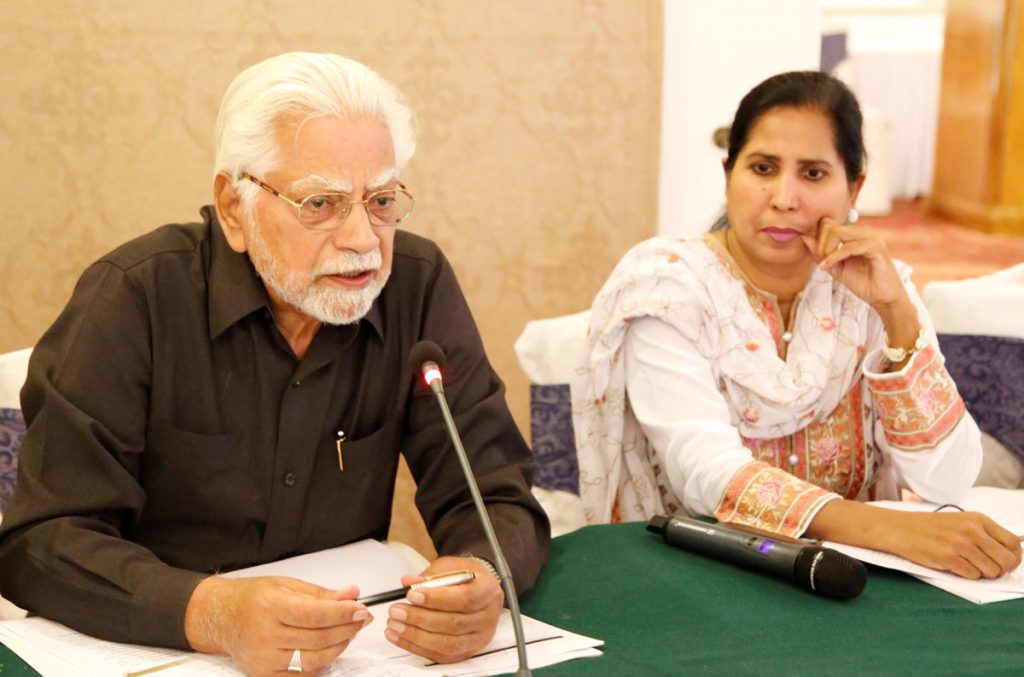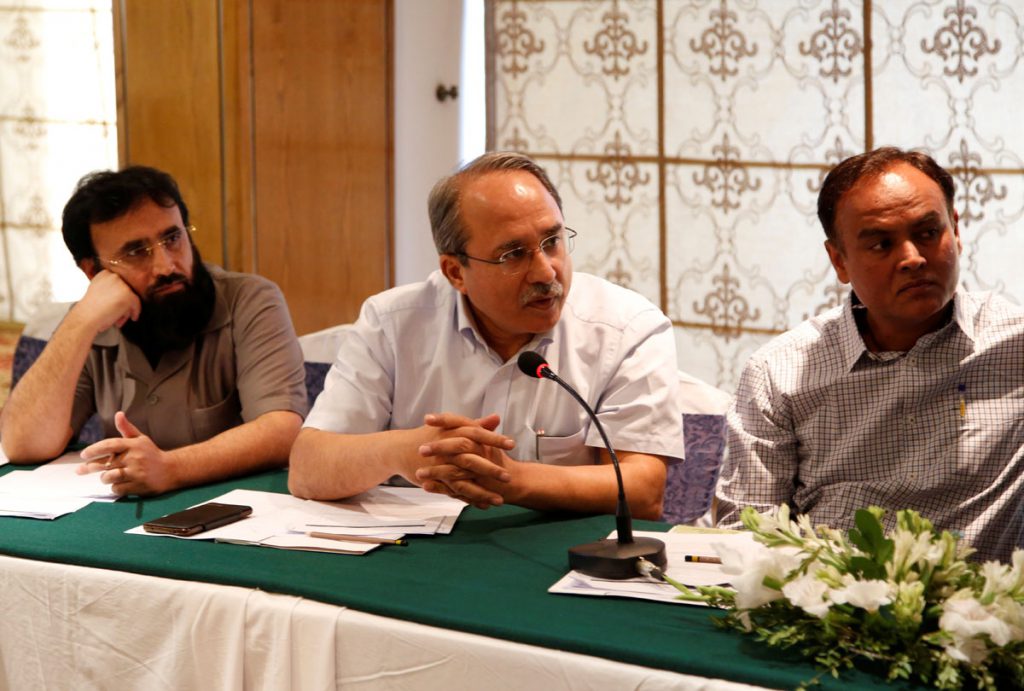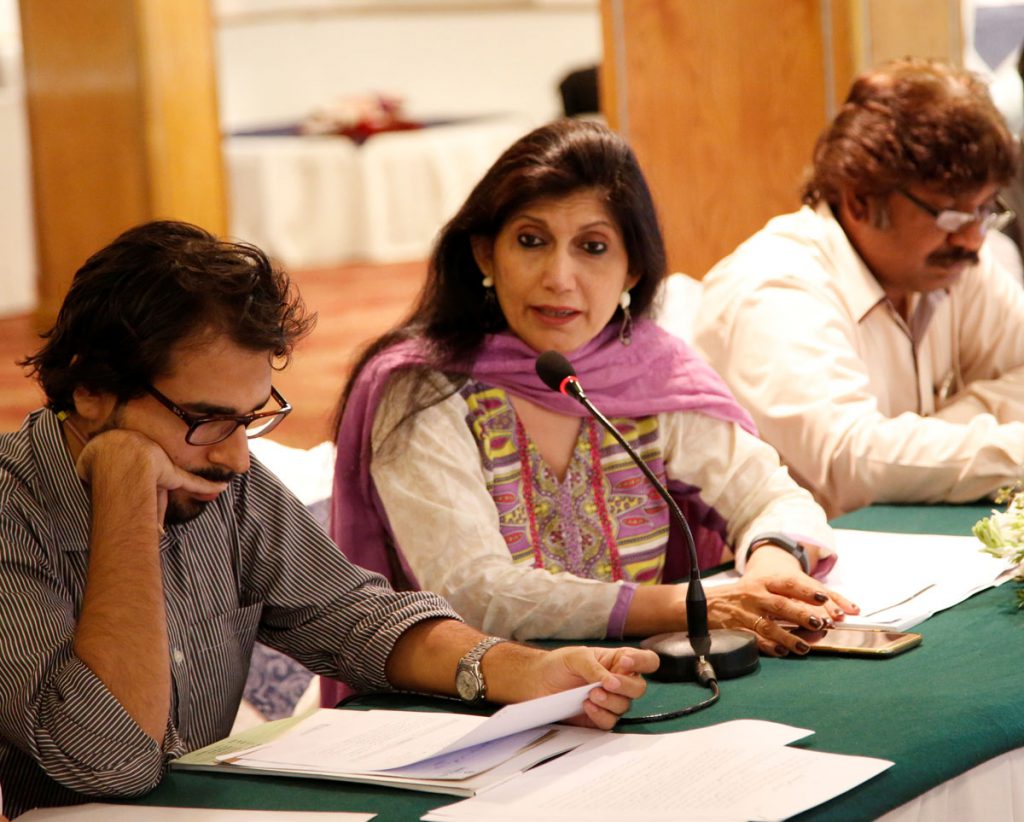To curb extremism, PIPS-led scholars suggest the first-of-its-kind inclusive national narrative
On 23 June 2016, members of a dialogue group discussed the contours of a new national narrative, which, once absorbed by the people of Pakistan, could greatly help dispel the space gained by extremists. They argued that the prevailing national narrative is often sympathetic to extremisms, to the distress of both state and society.
The dialogue group, comprising of diverse scholars and practitioners, was constituted by Pak Institute for Peace Studies, an Islamabad-based think-tank.
Attendees of the larger dialogue group included Dr. Khalid Masood, former chairman, Council of Islamic Ideology; Barrister Zafarullah Khan, minister of state for law and justice; Inam ul Haq, former foreign minister; Dr. Qibla Ayaz, former vice-chancellor, Peshawar University; Mr. Khursheed Nadeem, anchor and scholar; Zafarullah Khan, parliamentary affairs expert; Fauzia Saeed, head of Lok Virsa; Romana Bashir, peace-building activist; Dr. Ishtiaq Ahmad, academic; Dr. Farhan Zahid, security expert; Dr. Sohail Tajik, security expert; Nadeem Omar Tarar, director, National College of Arts; Dr. Hasan al-Ameen, scholar; Rushad Bokhari, peace-building activist; and Muhammad Amir Rana, director PIPS, among others.

Members of the core group, which was engaged in the first round included Barrister Zafarullah Khan, minister of state for law and justice; Inam ul Haq, former foreign minister; Mr. Khursheed Nadeem, anchor and scholar; Zafarullah Khan, parliamentary affairs expert; Ziauddin, senior journalist; Khadim Hussain, director, Bacha Khan Educational Foundation; Rashad Bokhari, peace-building activist; Dr. Hasan al-Ameen, scholar; and Muhammad Amir Rana, director PIPS. The core group met earlier, suggesting some areas around which the national narrative and CVE model could be built. These findings were shared with the larger dialogue group.
Starting off the discussion with the dialogue group, PIPS’s director Amir Rana attributed the rise to intolerance and militancy to narrow narratives invoked to justify certain goals. Even now, extremist elements continue to benefit from those narratives, once shaped by the state itself; instead, with time, those narratives have challenged the state. A participant, sharing his work experience, said that their work found that “while people might disagree with the actions of the extremists, but agree with their philosophy.”

A way to overcome that narrative is to, therefore, shape an inclusive narrative along with a Counter-Violent Extremism (CVE) model.
Scholars, who have been engaged in a two-staged process to shape that model, argued that one of the planks on which the prevailing narrative stands is narrow religious interpretation, thereby helping the extremists too. Participants vigorously debated whether any response – the new CVE model and narrative – should “pivot” around religion too. One argued that there is too much religiosity; to which it was said that many religious scholars had reservations over the religiosity in question.
The new narrative, it was shared, had religious response as one of the major planks, with other areas too incorporated. To reject their appeal, it was important to review afresh the religious construction of political terms. Mr. Rana argued that it is important to engage religious scholars to counter the extremist propaganda. Within this, participants suggested of studying the dynamics of the support behind extremist ideology. For example, a committee be constituted that enlist the literature fanning hatred.

One of the other themes of the counter narrative was acceptance of diversity, which should be appreciated as asset of Pakistan. The narrative of the extremists, the group agreed, was dangerous for social diversity, which already suffers from inequality. Today, the day-to-day conversation is adopting sectarian undertones, they warned. They called for a more pluralistic response. “The foundation of Pakistan identity should be the expression of multiple identities,” one said. One member suggested that “cultural diversity should be appreciated and made part of curriculum in both formal and informal schooling.” Another member argued that the parliamentary form of governance is a fit recipe to accommodate the diverse views in the country.

Discussants asked for setting the Constitution as guiding tool for both state and society. The new narrative in Pakistani society, one argued, the related “language and idiom should come out from the Constitution”, one reminded. They debated as to make of several clauses that justify the Constitution; it was suggested that since the Constitution was a consensus document, it better to taken up and a narrative around it be built.
Members also asked national and provincial government to address issues like class divide, problems in the justice system, poor governance, unequal distribution of resources, and population increase. Taking part in the discussion, former foreign minister Inam ul Haq suggested that instead of pivoting the entire conversation around religion only, it is advisable to offer remedies to issues like population bulge, etc.

Discussants also asked for evaluating instruments in pursuit of regional strategic interests. Some of them argued that the pivot around religion is unjustified, because extremism is a block back to the strategic policies, something about which many high state officials now admit. The worldview of religious language in Pakistan, they said, is similar to the strategic worldview. Yet, they argued, this too called for supremacy of the parliament and constitution, a point already discussed.
The group also suggested in specific of engaging youth, who constitute the majority in the country, who have been brought up in the narrow curriculum, who could be lured by extremist ideology. A participant suggested of expanding the identity of the youth, beyond religious alone.
Likewise, participants warned against invoking culture to justify murderous activities like honour killing. A progressive view of culture be promoted, so that when someone talks about it, the reference is not towards some stone age.

Meanwhile, PIPS shared basic themes of the proposed Counter-Violent Extremism Model (CVE) model for review from the discussants. Below are the salient features of the model, the details of which will be shared later:
-A National Dialogue Forum be constituted, comprising of scholars, academics, political and religious leaders and policymakers, to discuss the key challenges from various perspectives;
-A reintegration model of extremists be worked on, which could include tactical engagement with extremists to stop violence, their political and ideological reintegration, as well as long-term de-radicalization program;
-A rehabilitation strategy of detainees be devised;
-Greater effort should be made in implementing the National Action Plan, especially of the overhaul of the criminal justice system;
-More initiatives aimed at engaging youth, media, and promoting cultural activities be launched;
-Steps be taken towards reforming education at different tiers.
Media coverage

